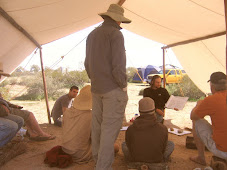Our pre-neolithic ancestors were able to achieve the feat of thriving in the wild -- seemingly impossible in the eyes of modern folks -- without a hitch. Why they were able to do this is simple: they knew the patterns; they knew where the food was; and they knew the ingenious methods to put a roast on the spit. In short: they knew the land.
So, before we get into the specifics of attaining adequate food in the wild -- calories and nutrients -- let's first acknowledge a very important primitive living skill that any modern-day abo should have in his or her repertoire: awareness. This means awareness of, not only skills, but also the place where these skills are being practiced. It goes without saying that knowledge of plants, animals, and seasonal variations in any given environment is a huge advantage in primitive living. Where's the water? Where's the food? Where's the hazards? Knowing these things is important. In addition to these things, an abo would be wise to have a keen sense of personal needs. This means asking questions, such as: What does true hunger feel like? When am I strongest? When am I weakest? Am I thirsty? Am I tired? It sounds easy enough, but, in my experience, this self-awareness was sorely lacking until I had plenty of "dirt-time."
To sum it up, awareness in primitive living can be thought of as a sense of one's own needs and how to meet them with the resources available. When we observe indigenous people in their environment -- their element -- it's readily apparent that they are very comfortable and content. They know themselves. They know their place. They are satisfied. With practice, we moderns can achieve a similar comfort and satisfaction in primitive living. In the world of health and nutrition, we cannot go back to the vibrancy in physical being of our ancestors. Similarly, in primitive living, we'll never be as skilled as Ishi, Last of the Yahi , but we can come close. I've met many people who have attained awareness, skills, and, most telling of all, comfort in the wilds. It can be done.
, but we can come close. I've met many people who have attained awareness, skills, and, most telling of all, comfort in the wilds. It can be done.
For a great resource on increasing your own personal awareness and nature skills, I highly recommend the Kamana Naturalist Training Program created by Wilderness Awareness School. For absolutely amazing dirt-time experience, check out the Boulder Outdoor Survival School. Also, primitive living skills can be learned hands-on at an affordable price at any of a number of skills gatherings across the country, the big two being Wintercount and Rabbitstick. By combining awareness and skills, primitive living enthusiasts can become "whole" in nature and truly feel at home.
Small Game in Primitive Living, Part 2 -- in which I'll delve into the calories and nutrients of whole animals and cooking methods to get the most out of your small game quarry -- is coming soon ...





No comments:
Post a Comment